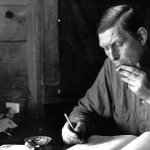“Breadth. Circle. Desert. Monarch. Month. Wisdom. (for which there are
No rhymes)” was just the title, and I only read that far.
That was because I felt like some old agent-of-the-Czar
When a new plotter swims within the scope of his exertions,
And I was scared this hothead would start hedging his assertions
Before I had him dead-to-rights. (A Chekan’s or a SMERSHian’s
Lot, you know, is not an happy one.) He might retract.
A liar is a liar is a liar. That’s his act.
But six distinct demonstrable defiances-of-fact
Before he hits line one? That’s taking aim at the World’s Record.
I wanted this quark-colored tangerine-flake double-deckered
Omnibus of absurdities to make it to the checkered
Flag. He had started fast, but could he forge on? Was he serious?
He had the Grand Prix style all right. Intense. Composed. Imperious.
And lies to burn. Poor lies, in no wise deep or deleterious.
He drove them home like thumb (or rather tooth nail fist and chin) tacks.
He planted Cosmic Glints to make you whimper for a glint-axe.
“Unconstellated words rain down ... inexorable syntax”
Etcetera etcetera.
It’s not that I’d set up,
Like Carrie Nation beating back the drunkard from his cup,
To scourge the world of liars. I’d as soon be Offissa Pup.
I’d sooner hassle fetishists and call myself a bra-narc.
If I were Lord of All (or even constitutional monarch)
I’d send a Deluge down, with one-way tickets on the Non-ark
For lying priests and pedagogues. They make a feller’s fez hurt.
But whom does Keats’s whopper about corpulent Cortez hurt?
Or any poet’s whopper? If he wants to say the Desert
Is made of pea-green Camembert, hell, welcome to the circle.
We listen to a Bard the way a certain kind of jerk’ll
Listen to leaves or listen to a percolator perkle.
As long as he can grind em out, a dozen-or-so a month,
We’ll praise him to the nth degree, and to the n-plus-1th
He could have called the thing “Fifth. Sixth. Eighth. Ninth. Twelfth. Baker’s dozenth”
For all we care. We’ll cheer him to the w-x-y-zedth
As long as his flimflammeries have brio and have breadth
And don’t come on like nursery-nannies pushing early-to-bedth
To three-year-olds with jingles about Health and Wealth and Wisdom.
He should look out, though. He might take himself in, and that is dumb.
Do that, and sure as malheur is the better part of Msdom,
Sententiousness will sidle in with snapshots in his wallet
To lay a little something on us camels: some small strawlet
“Width. Rhombus. (see Lozenge.) Glacier. Despot. Fortnight. Bilge.”
I told myself: “No overkill. Go easy on the bilge.”
But then. Tueur is human. And what rhymes with bilge is bilge.




















Comment form: